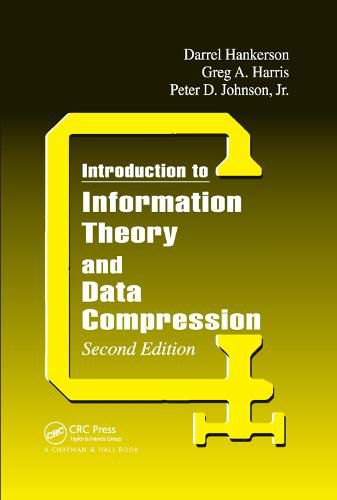Readings Newsletter
Become a Readings Member to make your shopping experience even easier.
Sign in or sign up for free!
You’re not far away from qualifying for FREE standard shipping within Australia
You’ve qualified for FREE standard shipping within Australia
The cart is loading…






An effective blend of carefully explained theory and practical applications, this text imparts the fundamentals of both information theory and data compression. Although the two topics are related, this unique text allows either topic to be presented independently, and it was specifically designed so that the data compression section requires no prior knowledge of information theory.
The treatment of information theory, while theoretical and abstract, is quite elementary, making this text less daunting than many others. After presenting the fundamental definitions and results of the theory, the authors then apply the theory to memoryless, discrete channels with zeroth-order, one-state sources.
The chapters on data compression acquaint students with a myriad of lossless compression methods and then introduce two lossy compression methods. Students emerge from this study competent in a wide range of techniques. The authors’ presentation is highly practical but includes some important proofs, either in the text or in the exercises, so instructors can, if they choose, place more emphasis on the mathematics.
Introduction to Information Theory and Data Compression, Second Edition is ideally suited for an upper-level or graduate course for students in mathematics, engineering, and computer science.
Features:
Expanded discussion of the historical and theoretical basis of information theory that builds a firm, intuitive grasp of the subject
Reorganization of theoretical results along with new exercises, ranging from the routine to the more difficult, that reinforce students’ ability to apply the definitions and results in specific situations.
Simplified treatment of the algorithm(s) of Gallager and Knuth
Discussion of the information rate of a code and the trade-off between error correction and information rate
Treatment of probabilistic finite state source automata, including basic resul
$9.00 standard shipping within Australia
FREE standard shipping within Australia for orders over $100.00
Express & International shipping calculated at checkout
An effective blend of carefully explained theory and practical applications, this text imparts the fundamentals of both information theory and data compression. Although the two topics are related, this unique text allows either topic to be presented independently, and it was specifically designed so that the data compression section requires no prior knowledge of information theory.
The treatment of information theory, while theoretical and abstract, is quite elementary, making this text less daunting than many others. After presenting the fundamental definitions and results of the theory, the authors then apply the theory to memoryless, discrete channels with zeroth-order, one-state sources.
The chapters on data compression acquaint students with a myriad of lossless compression methods and then introduce two lossy compression methods. Students emerge from this study competent in a wide range of techniques. The authors’ presentation is highly practical but includes some important proofs, either in the text or in the exercises, so instructors can, if they choose, place more emphasis on the mathematics.
Introduction to Information Theory and Data Compression, Second Edition is ideally suited for an upper-level or graduate course for students in mathematics, engineering, and computer science.
Features:
Expanded discussion of the historical and theoretical basis of information theory that builds a firm, intuitive grasp of the subject
Reorganization of theoretical results along with new exercises, ranging from the routine to the more difficult, that reinforce students’ ability to apply the definitions and results in specific situations.
Simplified treatment of the algorithm(s) of Gallager and Knuth
Discussion of the information rate of a code and the trade-off between error correction and information rate
Treatment of probabilistic finite state source automata, including basic resul